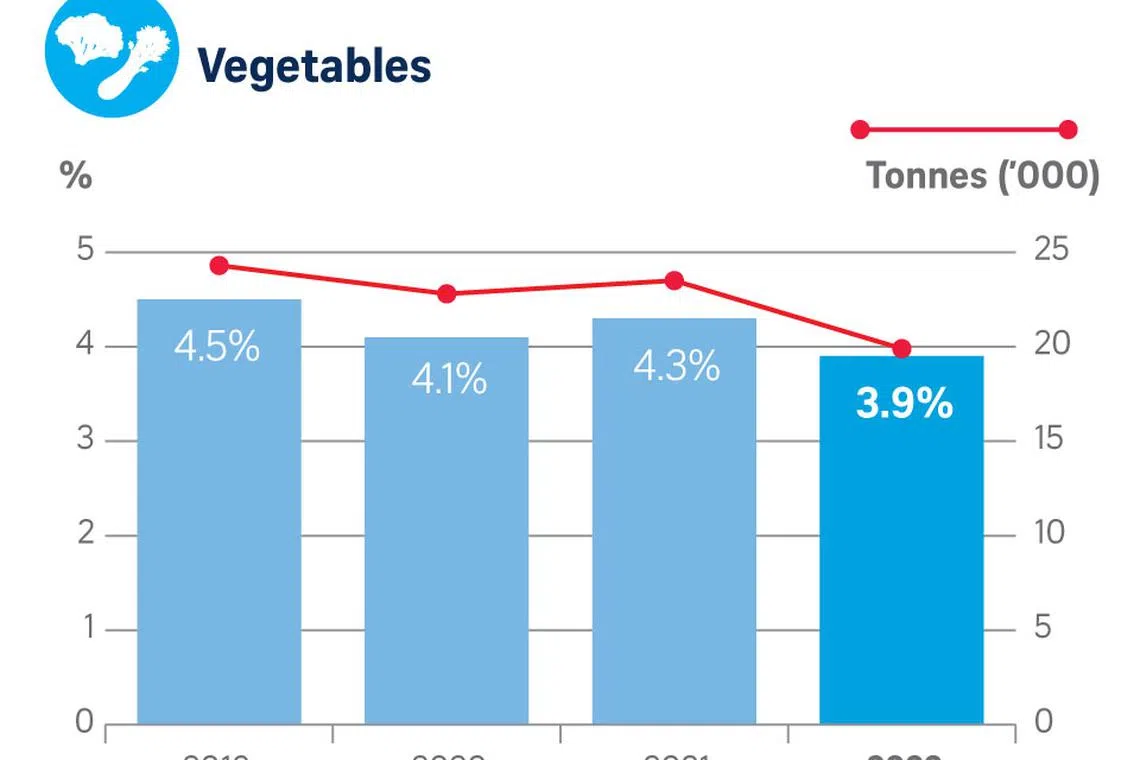Food production in S’pore declined in 2022 due to Covid-19-related delays, limited consumer support
Sign up now: Get ST's newsletters delivered to your inbox

Local egg production fell to 28.9 per cent in 2022, from 30.5 per cent the year before.
ST PHOTO: RYAN CHIONG
SINGAPORE – Vegetable, seafood and egg production in the Republic fell in 2022 due to dulled demand for local produce and delays in the building and upgrading of farms due to the Covid-19 pandemic.
While local egg production had steadily increased
This was due to an outbreak of a disease at a local farm in February 2022, said the Singapore Food Agency (SFA) in its annual food statistics report released on Thursday.
In February 2022, Seng Choon Farm in Lim Chu Kang had an outbreak of Newcastle disease, a viral illness that affects the respiratory, nervous and digestive systems of birds and poultry.
“Local egg production quickly normalised in the subsequent quarter. To manage the disease situation, SFA and the Animal and Veterinary Service worked with the farms to step up their biosecurity measures,” said SFA.
Less than 4 per cent of vegetables consumed in 2022 came from local farms. The share was 4.3 per cent in 2021.
As for seafood, local production fell to 7.6 per cent, down from 8 per cent in 2021.
Singapore has set a goal to produce 30 per cent of its nutritional needs by 2030.
“The Covid-19 pandemic caused delays in the establishment and upgrading plans of new and existing farms, which affected the ability of farms to reach their full production capacity,” said SFA.
“Additionally, a handful of farms had also ceased operations in 2022, while others had relocated to different areas of Singapore and needed time to ramp up their production capacities.”
The agency added that it remains committed to building the agri-food industry’s capability and capacity to sustainably meet its 2030 food security goals.
More land tenders will be introduced to support a wider range of food types amid plans to turn Lim Chu Kang into a high-tech agri-food zone, it said.
Local farms have said that low demand has made it difficult to make their businesses commercially viable.
Many consumers have been reluctant to buy local produce because it generally costs more than imported produce.
Some vegetable farms previously told The Straits Times that they have had to discard or donate a portion of their leafy greens because of low sales.
They have also had to scale down their production capacity to save on cost and reduce wastage.
To help tackle the demand issue, the local agri-food sector and SFA recently formed a coalition called the Alliance for Action to help generate consistent demand for local produce from commercial players.
One of the solutions proposed by the coalition is a common platform for local farms to supply produce to the hotel, restaurant and catering sectors.
In March, SFA and industry associations also started a scheme to recognise food businesses and hotels
Amid the push to boost food security, the number of places Singapore imports food from has risen from 172 countries and regions in 2019 to 183 in 2022.
For instance, Brunei, Colombia and Indonesia were approved as new sources for eggs,
While Singapore has more countries to import from, the total amount of seafood, vegetables and fruits imported saw a slight dip between 2021 and 2022.
For vegetables, 518,000 tonnes were imported in 2022, down from 544,400 tonnes in 2021.
Professor William Chen, director of the Nanyang Technological University’s Food Science and Technology programme, said inflation and supply chain woes caused by the pandemic and the Russia-Ukraine war could have led to the slide in the quantity of some food imports.
He added that the technologies for urban vegetable farming and aquaculture in Singapore are still nascent, and will require some time to scale up.
Prof Chen is confident that local egg production will continue to increase despite the slight drop in 2022 as local farms ramp up their production and a fourth egg farm is set up.
The fourth farm – a collaboration between local company Ise Foods Holdings and Japan’s top egg producer Ise Foods Japan – is expected to start operations from 2024 and increase local egg production to 50 per cent of demand once it is fully up and running in the coming years.
On the food safety front, food recalls rose by about 22 per cent in 2022.
But fewer people fell ill from foodborne illnesses in 2022, measuring about 24 per 100,000 people. In 2021, 25.6 per 100,000 had foodborne illnesses.

Correction note: In an earlier version of the story, we said that live chicken was imported from Indonesia in 2022. This is incorrect. Frozen, chilled and processed chicken were imported from the country that year. We are sorry for the error.


